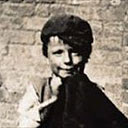invisible walls

A fascinating story in today's Guardian tells the story of Harry Bernstein, a 96-year-old who has published a memoir about the divisions between residents on his childhood street in Stockport, just a few miles from where I now live.
Bernstein grew up in a Jewish family during the First World War and describes the "invisible walls" which existed between his community and his Christian neighbours. He was taught to spit at churches as he passed them and faced anti-semetic baiting in the playground and even from adults.
"Bernstein can only speak for one side of the street because his contact with the other was so limited. He says that the prevailing feeling within his family was that the Christians were somehow beneath them. While they worked in the mills, the Jewish men were tailors; while the Christians wore iron-shod clogs, the Jews aspired to leather shoes.
"The cruel irony of such judgments was that, in truth, both sides were locked into unspeakable poverty. Young Harry slept in a single bed with his two brothers, and he describes in heart-wrenching detail how his mother had to beg for food while trying to hang on to her dignity.
"'You would think that poverty was a leveller that would drag all of us down to the same depth. But it wasn't like that,' Bernstein says."
One of the things which is most powerful about the interview with Bernstein, and no doubt his book, is the timelessness of his story. Almost a century on, how little has actually changed?
For the most part, the UK in 2007 seems a friendly and tolerant enough place to be. But can plain old tolerance be a good enough substitute for genuine respect for and identification with those who are different?
Perhaps the divisions between communities are less pronouced now than in 1914 - equality is, after all, now enshrined in law. But does that mean such differences do not exist? Clearly not.
The Jews of Bernstein's day may have largely (but not entirely) been replaced by the moden day bogeymen - namely Muslims, asylum seekers and the white underclass - but the walls are still standing, albeit it slightly more subtle in appearance.